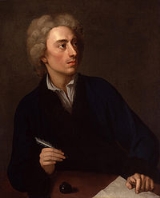
. He is the third-most frequently quoted writer in The Oxford Dictionary of Quotations, after Shakespeare
and Tennyson. Pope is famous for his use of the heroic couplet
.
Pope was born to Alexander Pope Senior (1646–1717), a linen merchant of Plough Court, Lombard Street, London, and his wife Edith (née Turner) (1643–1733), who were both Catholics.
Happy the man whose wish and care A few paternal acres bound, Content to breathe his native air In his own ground.![]()
Thus let me live, unseen, unknown; Thus unlamented let me die; Steal from the world, and not a stone Tell where I lie.![]()
They dream in Courtship, but in Wedlock wake.![]()
The mouse that always trusts to one poor hole Can never be a mouse of any soul.![]()
Love seldom haunts the breast where learning lies, And Venus sets ere Mercury can rise.![]()
Histories are more full of Examples of the Fidelity of dogs than of Friends.![]()
I am his Highness' dog at Kew; Pray tell me, sir, whose dog are you?![]()
Nature and Nature's laws lay hid in night: God said, "Let Newton be!" and all was light.![]()
The flying Rumours gather'd as they roll'd, Scarce any Tale was sooner heard than told; And all who told it, added something new, And all who heard it, made Enlargements too, In ev'ry Ear it spread, on ev'ry Tongue it grew.![]()
Nor Fame I slight, nor her favors call; She comes unlooked for, if she comes at all.![]()

